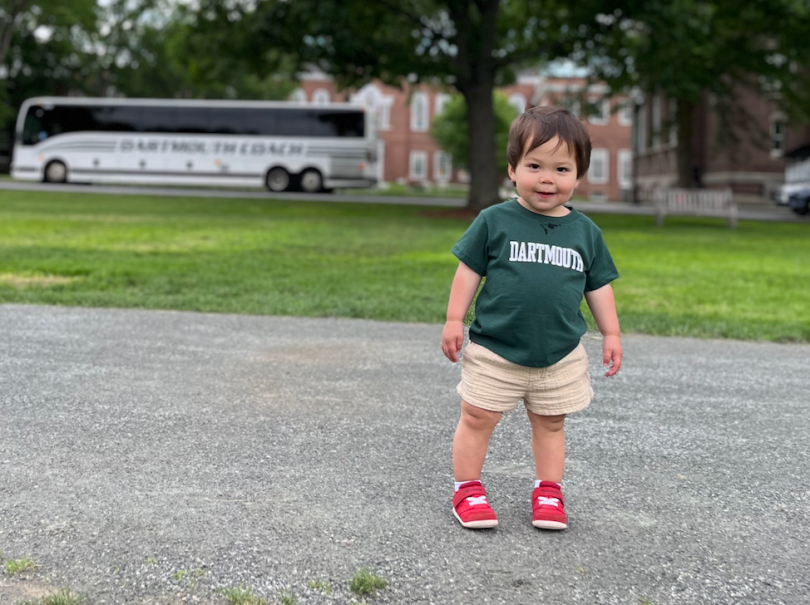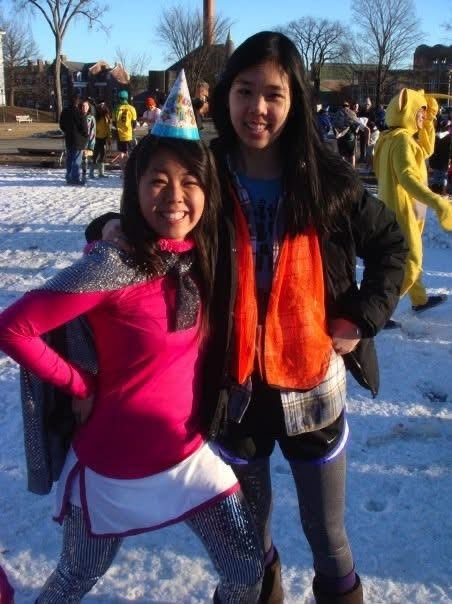
Q&A with Alumna Geography Major Michelle Lee '13
At a recent Dartmouth event in Atlanta, I met such a friendly alumna named Michelle Lee '13, and I decided to do a Q&A with her to learn more about her unique time at and after Dartmouth!
1. Could you introduce yourself and share a little bit about your background—your name, class year, major, where you're from, and what you're doing now?
I'm Michelle Lee, a '13 undergrad, and I majored in Geography with a focus on international development, human geography and cultural studies. During my time in the major, I did a lot of fieldwork, particularly looking at food businesses and cross-cultural contacts. I also wrote a thesis on Chinese food entrepreneurs—Chinese restaurateurs moving to Ghana in West Africa, setting up businesses, and navigating the immigrant experience. That was a great example of how a liberal arts education shaped my interests. I'm from Chicago but now live in Atlanta. Right now, I am at a very early-stage, Series A, venture-backed startup called Subscript. We serve B2B software companies, providing a billing and analytics platform. (After Dartmouth, Michelle also attended Harvard Business School).
2. What were some of the most formative experiences you had during your time at Dartmouth, whether academic, extracurricular, or social?
I'll definitely point to study abroad. That was a big reason I was drawn to Dartmouth—you could study abroad not just once, but even twice. And that's what I did. The summer after my first year, I did the Beijing FSP (Foreign Study Program), which was so much fun. The language learning aspect was great, but exploring a new city with Dartmouth classmates was incredible. I also got really into food, going to different restaurants, and meeting local people. During that FSP, we also traveled within China, including a trip to Yunnan, one of the most diverse regions in the country. Seeing so much diversity within one country was really cool.
For my junior fall, I arranged my own exchange program at the University of Ghana. I didn't get Dartmouth credit for it– it was more about using my off-term flexibility to do what I wanted, which was studying abroad. I lived in the dorms with other international students. Going by myself, instead of with a Dartmouth-sponsored program, meant I set my own goals. The experience wasn't about academics but rather exploring the city independently and immersing myself in a cross-cultural experience. I took public transportation, and sometimes I'd go to the local markets to bargain and buy things. I also took trips to Togo and Burkina Faso with friends I met at the university. That experience really highlighted Dartmouth's flexibility with the D-Plan; the flexible quarters were transformative for me.
3. It sounds like study abroad really influenced your thesis, combining both experiences.
Yes, exactly! I had actually done a homestay in Ghana when I was in high school for a month. When I had the chance to study abroad at the University of Ghana during my junior year, I was excited to go back for four to five months. I fell in love with being there, and for my thesis, I secured Dartmouth funding to return for fieldwork. I spent about six weeks conducting interviews and collecting qualitative data for my research.
4. That's really cool! And you also met your husband at Dartmouth, right?
Yes! Well, we actually got to know each other post-Dartmouth. We met because we were both set to work at the same company after graduation. We first met at an offer dinner for Bain & Company in Boston, where we were both headed. So, he wasn't really part of my Dartmouth experience, which is kind of funny—Dartmouth alums just tend to find each other later on. We became friends, then dated, got married, and now have kids!

5. How did your Dartmouth education and community shape your career path? Were there any particular classes, professors, internships, or organizations that influenced where you are now?
Dartmouth is such a liberal arts school, and my major was very liberal arts-focused. What Dartmouth really helped me do was explore topics I was deeply interested in and develop critical thinking skills. Many geography classes were small, seminar-style discussions, where we debated, researched, and learned different perspectives. That approach to learning was transformative for me.
Even though my major wasn't quantitative, Dartmouth's career recruiting system allowed me to pursue opportunities that weren't directly related to my studies. I had never used Excel before, but I secured an internship at Bain after my junior year and learned a lot. Employers evaluate Dartmouth students based on their broader skills—not just technical experience. The ability to translate liberal arts skills into unexpected career paths was key for me. Dartmouth prepared me for that transition and helped me build a strong foundation for my career in business and tech.
6. How has the Dartmouth alumni network played a role in your life after graduation—whether in your career, friendships, or sense of community?
Dartmouth alums love meeting other Dartmouth alums, no matter the class year. One fun example is that almost every time I fly and wear a Dartmouth sweatshirt, someone talks to me about it. It could be an alum, a current student, or even a family member of someone who went to Dartmouth. That sense of community is so special. In terms of friendships, my best friend from Dartmouth and I met as trippees on First Year Trips. We roomed together from sophomore to senior year. Even after Dartmouth, we lived together in San Francisco. Now, even though we're in different cities, we still visit each other regularly. That kind of lifelong friendship is something I treasure.

7. What would you say to students thinking about attending Dartmouth?
My top takeaway is that Dartmouth is in a truly special location. Where else can you live in a rural area for four years, build deep friendships, and immerse yourself in nature? Without the distractions of a big city, you really focus on the community and the people around you. That tight-knit environment makes Dartmouth unique. At the same time, there's something for everyone. Even though it's a smaller school, there are so many activities, clubs, and research opportunities. You can really make Dartmouth your own if you take the initiative. Whether it's study abroad, fieldwork, or extracurriculars, Dartmouth offers a flexible and supportive environment to explore your interests.


















